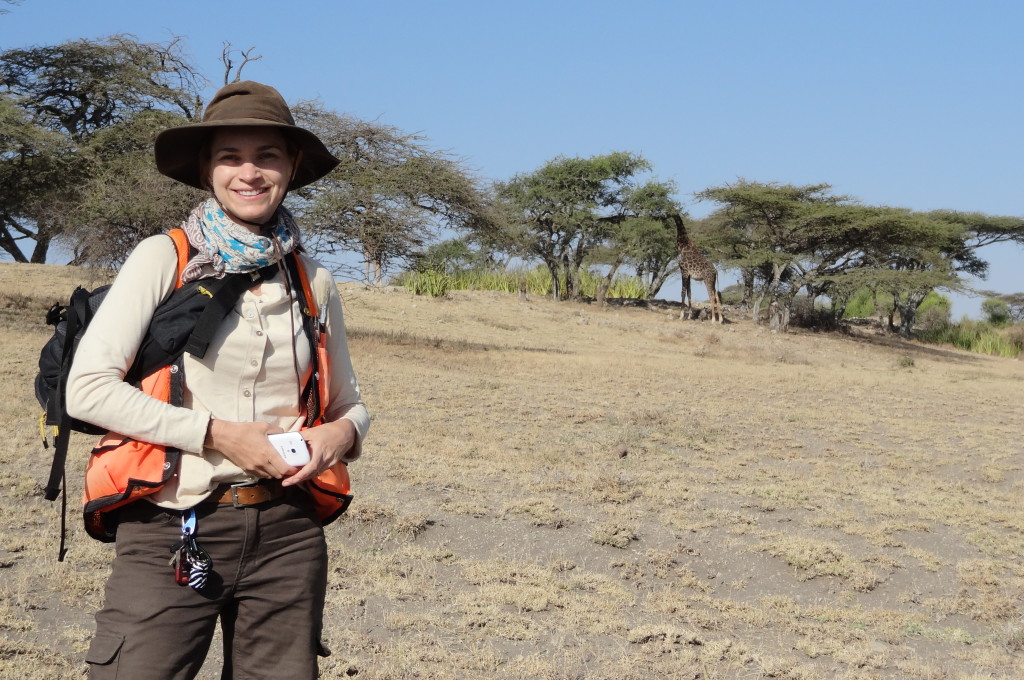
PhD and MA from Penn State, BA from University of Virginia
Field sites past & present: Ethiopia, Kenya, Tanzania, Wyoming
Olduvai Gorge, Tanzania: one of the richest paleontological and archeological sites in the world. The name alone sends shivers of excitement down many spines. Its sediments record the last two million years and preserve four hominid species (2 holotypes are from Olduvai) and many, many stone tools. In fact, the stone tools from Olduvai are so significant that the earliest stone tool technology is called the “Olduwan Industrial Complex.” Olduvai Gorge was the stomping grounds of the Leakeys for over fifty years, in addition to numerous other paleontologists, archeologists, and geologists. Today, it is the primary field site of Dr. Leslea Hlusko, co-director of one of four active projects at Olduvai: the Olduvai Vertebrate Paleontology Project (OVPP).
Much of the early work at Olduvai had an anthropological focus, aimed at discovering more hominids or piecing together the development of stone tools. Leslea and her colleagues in OVPP want to reconstruct the entire paleoenvironment of Olduvai. To do this, they spend several months in the field each year, systematically scouring the sediments for new fossil material, carefully noting its location in space (geography) and in time (stratigraphy). In addition, they are compiling a database of all previously collected specimens. This involves visiting museums all over the world that house material from Olduvai and making sure all fossils have specimen numbers, are correctly identified, and are uploaded into the database. Their view is that every fossil is important to understand and successfully reconstruct the landscape in which our ancestors and their early technology evolved.
Besides fieldwork and the OVPP, Leslea collaborates with geneticists and primate biologists to study variation within a species. Variation is key to evolution by natural selection, and so understanding how much and what kinds of variation are due to genes vs. environment is important for diagnosing species and determining how fossil species are related to each other. Leslea focuses on teeth (the most commonly preserved vertebrate fossils) and baboons (primates like us). She and her colleagues make detailed measurements of baboon teeth from the carefully pedigreed Southwest National Primate Research Center. By knowing how the baboons are genetically related, they can start to distinguish the aspects of tooth morphology that are genetically controlled versus environmentally controlled. Leslea has applied her modern results to the fossil record to reinterpret how some hominid species are related to each other.
While genetics and modern baboons are important for Leslea’s science, you can tell from a short conversation with her that she is a field paleontologist at heart. Her advice to future paleontologists includes learning to drive a stick shift, change a tire, use a shovel, shower with less than 1L of water, and identify poisonous snakes. And to use fieldwork as a chance to truly experience different cultures and get a better sense of the similarities and variations within our species. Her passion for paleontology and especially for fieldwork is evident in this interview with for the Leakey Foundation (https://www.youtube.com/watch?v=xhaEbYhUeto) and also this portion of an email Leslea sent me. I hope she won’t mind my sharing it, because I think a whole lot of my readers blog can relate.
Leslea wrote, “I do the fieldwork because I love it, just like you and all the other women we know. Not for the kudos. In some ways, perhaps the women who do fieldwork have a more pure love of the field sciences, because we definitely don’t get the ‘Indiana Jones’ bump that our male counterparts do. I mean really, have you ever gotten a hot date based on your fieldwork experience? If anything, it is a detriment to our romantic lives.”
Based on my own experiences, I couldn’t agree more.
For more information about Dr. Leslea Hlusko, visit: http://ib.berkeley.edu/labs/hlusko/index.php
The Understanding Evolution team has put together a really nice module on Leslea’s baboon work, complete with lesson plan and discussion questions at: http://evolution.berkeley.edu/evolibrary/article/hlusko_01
Correct a couple typos in this blog before anybody else reads it.
Its, not it’s, location in space.
Leslea genetics. Not sure you meant to use her name here.
Thanks, Mom. It is fixed now.